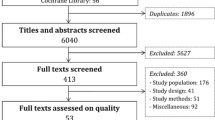Summary
Objective
The objective of this study was to evaluate adherence and causes for non-adherence to antihypertensive therapy in Austrian patients. A special focus was placed on social parameters and behavioural theories.
Methods
Patients were invited via advertisements in community pharmacies in Austria to complete an online survey. Inclusion criteria were an age of 18 years or older, a diagnosis of arterial hypertension and a current prescription of antihypertensive medication. Adherence was measured by the four-item Morisky scale. Non-adherence was defined by at least one point in the Morisky scale. Several demographic, social and behavioural parameters were analysed as potential co-variables associated with adherence.
Results
A total of 323 patients completed the online survey, of which 109 (33.7 %) met the criteria for non-adherence. In a multivariable model, self-efficacy and age were associated with adherence, whereas intention and barriers were linked to non-adherence; 56 patients (17.3 %) were classified as intentionally non-adherent.
Conclusion
This study demonstrates that non-adherence affects an important proportion of patients in the treatment of arterial hypertension. Young age was a particularly important risk factor for non-adherence, and this patient population is, therefore, in need of special attention. Modifiable risk factors were identified that could help improving the treatment of arterial hypertension and potentially other chronic conditions.
Similar content being viewed by others
References
Osterberg L, Blaschke T. Adherence to medication. N Engl J Med. 2005;353(5):487–97.
Sabaté E, WHO Adherence to Long Term Therapies Project, Global Adherence Interdisciplinary Network, World Health Organization, Department of Management of Noncommunicable Diseases. Adherence to long-term therapies: evidence for action. Geneva: World Health Organization; 2003. 196 pp.
Vrijens B, De Geest S, Hughes DA, Przemyslaw K, Demonceau J, Ruppar T, et al. A new taxonomy for describing and defining adherence to medications. Br J Clin Pharmacol. 2012;73(5):691–705.
Myers MG. Compliance in hypertension: why don't patients take their pills? CMAJ. 1999;160(1):64–5.
Iskedjian M, Einarson TR, MacKeigan LD, Shear N, Addis A, Mittmann N, et al. Relationship between daily dose frequency and adherence to antihypertensive pharmacotherapy: evidence from a meta-analysis. Clin Ther. 2002;24(2):302–16.
Hansson L. ‘Why don't you do as I tell you?’ Compliance and antihypertensive regimens. Int J Clin Pract. 2002;56(3):191–6.
Morisky DE, Green LW, Levine DM. Concurrent and predictive validity of a self-reported measure of medication adherence. Med Care. 1986;24(1):67–74.
Morisky DE, Ang A, Krousel-Wood M, Ward HJ. Predictive validity of a medication adherence measure in an outpatient setting. J Clin Hypertens (Greenwich). 2008;10(5):348–54.
Scheier MF, Carver CS, Bridges MW. Distinguishing optimism from neuroticism (and trait anxiety, self-mastery, and self-esteem): a reevaluation of the Life Orientation Test. J Pers Soc Psychol. 1994;67(6):1063–78.
Horne R. The beliefs about medicines questionnaire: the development and evaluation of a new method for assessing the cognitive representation of medication. Psychol Health. 1999;14:1–24.
Ajzen I, Mannheimer Zentrum für Europäische Sozialforschung. The theory of planned behavior: habit, perceived control, and reasoned action. Mannheim: Mannheimer Zentrum für Europäische Sozialforschung; 2000. 18 pp.
Grol R, Wensing M, Mainz J, Ferreira P, Hearnshaw H, Hjortdahl P, et al. Patients’ priorities with respect to general practice care: an international comparison. European Task Force on Patient Evaluations of General Practice (EUROPEP). Fam Pract. 1999;16(1):4–11.
Dobbels F, Moons P, Abraham I, Larsen CP, Dupont L, De Geest S. Measuring symptom experience of side-effects of immunosuppressive drugs: the Modified Transplant Symptom Occurrence and Distress Scale. Transpl Int. 2008;21(8):764–73.
Schmid-Mohler G, Thut MP, Wuthrich RP, Denhaerynck K, De Geest S. Non-adherence to immunosuppressive medication in renal transplant recipients within the scope of the Integrative Model of Behavioral Prediction: a cross-sectional study. Clin Transplant. 2010;24(2):213–22.
Broadbent E, Petrie KJ, Main J, Weinman J. The brief illness perception questionnaire. J Psychosom Res. 2006;60(6):631–7.
Devonshire V, Lapierre Y, Macdonell R, Ramo-Tello C, Patti F, Fontoura P, et al. The Global Adherence Project (GAP): a multicenter observational study on adherence to disease-modifying therapies in patients with relapsing-remitting multiple sclerosis. Eur J Neurol. 2011;18(1):69–77.
Eagle KA, Kline-Rogers E, Goodman SG, Gurfinkel EP, Avezum A, Flather MD, et al. Adherence to evidence-based therapies after discharge for acute coronary syndromes: an ongoing prospective, observational study. Am J Med. 2004;117(2):73–81.
The-ABC-Project-team. Ascertaining barriers for compliance: policies for safe, effective and cost-effective use of medicines in Europe. 2012. http://abcproject.eu/img/ABC%20Final.pdf
Giles M, McClenahan C, Cairns E, Mallet J. An application of the Theory of Planned Behaviour to blood donation: the importance of self-efficacy. Health Educ Res. 2004;19(4):380–91.
Strecher VJ, DeVellis BM, Becker MH, Rosenstock IM. The role of self-efficacy in achieving health behavior change. Health Educ Q. 1986;13(1):73–92.
Meyerowitz BE, Chaiken S. The effect of message framing on breast self-examination attitudes, intentions, and behavior. J Pers Soc Psychol. 1987;52(3):500–10.
Conner M, Norman P. Predicting health behaviour: research and practice with social cognition models. Buckingham: Open University Press; 1996. ix, 230 pp.
Bandura A. Self-efficacy: the exercise of control. New York: W.H. Freeman; 1997.
Husebo AM, Dyrstad SM, Soreide JA, Bru E. Predicting exercise adherence in cancer patients and survivors: a systematic review and meta-analysis of motivational and behavioural factors. J Clin Nurs. 2013;22(1–2):4–21.
Perl S, Riegelnik V, Mrak P, Ederer H, Rakovac I, Beck P, et al. Effects of a multifaceted educational program on blood pressure and cardiovascular risk in hypertensive patients: the Austrian herz.leben project. J Hypertens. 2011;29(10):2024–30.
Author information
Authors and Affiliations
Corresponding author
Rights and permissions
About this article
Cite this article
Lötsch, F., Auer-Hackenberg, L., Groger, M. et al. Adherence of patients to long-term medication: a cross-sectional study of antihypertensive regimens in Austria. Wien Klin Wochenschr 127, 379–384 (2015). https://doi.org/10.1007/s00508-015-0782-y
Received:
Accepted:
Published:
Issue Date:
DOI: https://doi.org/10.1007/s00508-015-0782-y




